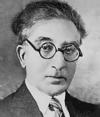- Cavafy, Constantine
-
died April 29, 1933, AlexandriaPoet of Turkish-Greek ancestry.Born to Greek parents, Cavafy worked as an obscure civil servant in Alexandria his entire adult life. His small body of work, some 200 poems in an intimate, realistic, lyrical style, is written in a strange combination of classically based and modern Greek. Many deal with history, principally the Hellenistic era; many others reflect Cavafy's homosexual life. His poems became popular and influential after his death, and he is now widely regarded as one of the greatest of modern Greek poets.
 Constantine Cavafy.Dimitri Papadimos
Constantine Cavafy.Dimitri Papadimos* * *
▪ Greek writerpseudonym of Konstantínos Pétrou Kaváfisborn April 17, 1863, Alexandriadied April 29, 1933, AlexandriaGreek poet who developed his own consciously individual style and thus became one of the most important figures not only in Greek poetry but in Western poetry as well. He lived most of his life in Alexandria, loved English and French literature, and generally spoke English; even his Greek had a British accent.Cavafy wrote much but was his own harshest critic, publishing only about 200 poems. His most important poetry was written after his 40th year, and with some justification he called himself a “poet of old age.” A skeptic, he denied or ridiculed traditional values of Christianity, patriotism, and heterosexuality, though he was ill at ease with his own nonconformity. His language is a strange mixture of the refined and stilted Greek called Katharevusa, inherited from the Byzantines, and the Demotic, or spoken, tongue. His style and tone are intimate and realistic. The lyric treatment he gave to familiar historical themes made him popular and influential after his death. He is well-known to English readers from the many references to his work in Lawrence Durrell's Alexandria Quartet. Cavafy's poems were first published without date before World War II and reprinted in 1949. An English translation, The Poems of C.P. Cavafy, appeared in 1951.* * *
Universalium. 2010.
